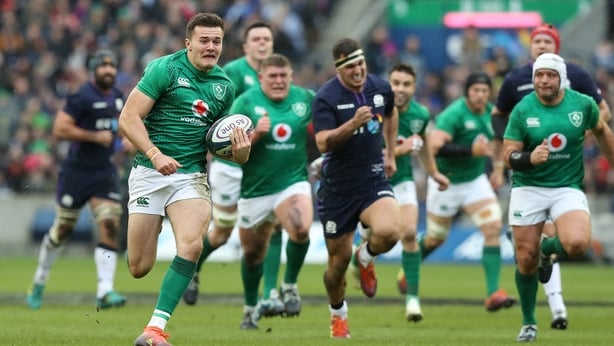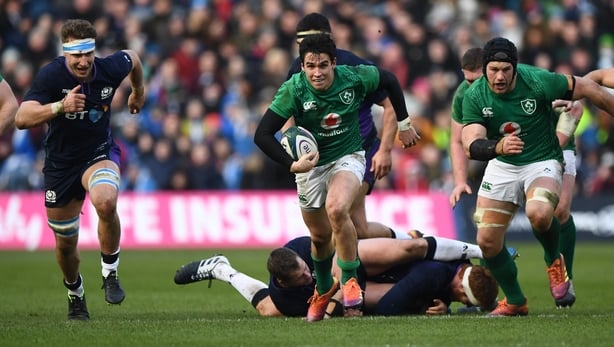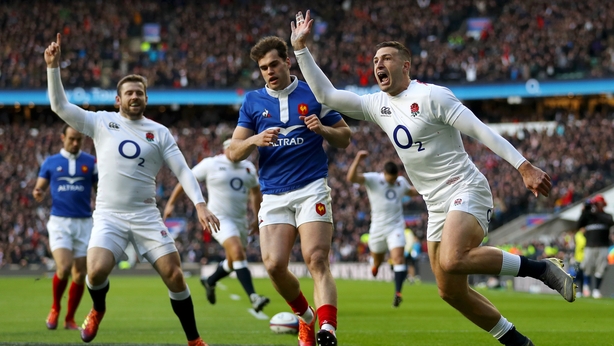Ireland got back to winning ways over the weekend in Murrayfield against Scotland but it still wasn’t convincing.
It is probably one of those wins that feels great in the dressing room because of the pressure on the team, the poor weather conditions and the intangible effects of Scottish passion on home soil.
We don’t feel any of that at home watching it through a TV screen. You can understand the conditions but not to the full effect and the rest is privy to anyone that is in or around that Irish squad.
In spite of all that I’m still not convinced by the Irish performance. Conor Murray showed his own frustration when crossing the try line in what was a well-worked phase of play initially.
Ireland weren’t getting much change on the openside of the ruck so they reloaded down the blindside a couple of times to give Jacob Stockdale a bit of room.

In textbook Stockdale fashion he opted for a chip and chase but the try was gifted to Ireland in the end. That’s not to take away from Chris Farrell’s hunting down of Tommy Seymour and the Irish hunger to be next to pounce but it wasn’t exactly flowing attack that got them over the line.
Maybe they were due a bit of good fortune after the previous week.
Either way I doubt they cared too much how that try was scored; a good start was a necessity.
Ireland’s next try was straight from the Joe Schmidt handbook: intricate first phase with plenty of movement and dummy lines followed by a trick play between Peter O’Mahony and Johnny Sexton to set Stockdale free who showed a clean pair of heels to go under the posts untouched.
That was a good platform to allow the team to settle down and play their usual rugby but they never really opened up after that.
The Irish attack is playing very flat with limited time for decision making and very few live decisions being made.
They look like a team that know where they are going each time they get the ball but unfortunately the opposition seem to know as much and are stopping the attack on the gain line. We saw that with Joey Carbery’s intercept pass.
You could say that any dangerous attack brings the ball close to the gain line and that allows them to go at the defence and make a decision late to catch out defenders.
However, I don’t think this was the case. Carbery barely moved his feet before shipping the pass to the forward pod outside him and Finn Russell made an easy read to set up Sam Johnson for the score.
The only positive in that play was seeing Keith Earls' blistering pace to catch Russell but the Scot was calm and popped a superb pass to Johnson. Earls at full pace is fascinating to watch; he's like a thoroughbred horse.

It wasn’t Carbery’s youth or inexperience at Test level that caused that intercept. We saw Sexton do the same last week.
The attack has been very flat for the last two games. Against England you could have argued that it was down to the English line speed closing down that space quickly. Scotland tried to match that too and caused some problems for Ireland.
Any team watching on will think it is the answer to unsettling the Irish attack, especially considering Ireland don’t like to kick too much ball away allowing the defence to worry less about that pocket of space behind the defensive line.
One of the positives to come from the game is that Rob Kearney is back and was one of the standout players. He created the spark in the back line beating five defenders on his way to three clean line breaks. He was comfortable in the back field.
Everyone around him looked comfortable too. Schmidt might hand some game time to the next in line against Italy, whoever that may be at the moment, but his first choice full-back has to be Kearney after that performance.
Despite his line breaks Ireland were sloppy in moving the ball. Even Earls' try was a moment of magic from Carbery as opposed to the fluent Irish play that we’ve seen before.
Another positive from the game was the work ethic of Irish players to dig themselves out of a hole. Earls showed his desire to get on the end of Carbery’s pass from a good 20 yards away, Murray was the same for his try and they kept Scotland to a breakaway try with a brace of penalties.

Elsewhere in the competition, France were never going to cause an upset in Twickenham but I still didn’t expect that result. England are humming after the first two rounds of the tournament and won’t fear Wales at the Millennium Stadium.
A Welsh win is Ireland’s only hope to get back into the competition and then have to travel to Wales on the last day of the tournament to cause an upset.
Ireland are still up against it unless they can pick up bonus points in their remaining three games and hope that England stutter against Scotland and Wales.
England’s ability to pick up bonus points makes them near impossible to stop. They’re sure to pick up another against Italy and you can’t really see Scotland causing much trouble in Twickenham.
It means that even if Wales manage to disrupt the English Grand Slam success and cause Ireland to fall to another frustrating defeat, Eddie Jones' men will still more than likely go on to win the competition.
Maybe the outcome of the Six Nations isn’t the most important thing in this calendar year but you can’t argue with a winning momentum. If you had the choice you would take a Grand Slam in a World Cup year and create that winning atmosphere.
You can’t just turn it on and off when you feel like it. Winning is a mentality that breeds confidence while one loss can almost shatter it overnight. It doesn’t mean losing one game makes you a bad team but you must build that momentum back up.
For now, Irish players will have a break to catch up with family and friends, take a step away from training, media and their coaches for a few days before returning to the mental challenge of Six Nations camps.


